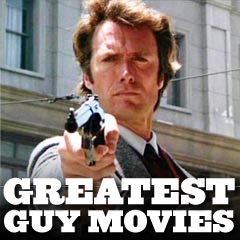
|
of All-Time 1977-1979 |
![]()
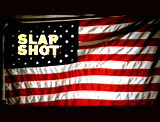
|
Slap Shot (1977) Director George Roy Hill's irreverently funny and bloody sports film (with a screenplay by Nancy Dowd), one of the best ever made, starred Paul Newman as aging, hockey star Reggie Dunlop. He was appointed player/coach of The Charlestown Chiefs of the Federal Hockey League, a failing minor league team in a Pennsylvania steel-mill town. The film was noted for its rampant profanity, adolescent behavior, nudity, and on-ice rough-house violence in order to save the franchise, mostly delivered up by The Hanson Brothers trio (Jeff, Steve, and Jack, played by Jeff & Steve Carlson and David Hanson) who wore black-framed coke-bottle glasses. The film reflected the late 70s era of diminishing masculinity.
"I'm gonna flash' em, Joe!...I'm gonna walk down that stinkin' aisle, I'm gonna open this faggot robe and wiggle my dick at 'em!...Yes, I am Joe, and you know why? Because I want you to have a heart attack and die so that we never have to do this s--t again! You and your f--kin' fashion shows!...I'm gonna wiggle it at 'em, you cheap bastard. I'm tellin' ya. You'd better be prepared, because when I yank it out, everybody in that audience, with the exception of my wife, is gonna be runnin' for the exits." "F--kin' machine took my quarter...It took my quarter." Peterboro Referee (during the National Anthem): "I
got my eye on the three of you guys. You pull one thing, you're out
of this game. I run a clean game here. I have any trouble, I'll suspend
ya." "Hanrahan - Suzanne sucks pussy! Hey, Hanrahan, she's a dyke! I know, I know! She's a lesbian, a lesbian, a lesbian!" "Old-time hockey."
Jim Carr's (Andrew Duncan) live-TV interview about the "finer points of hockey" with player Denis Lemieux (Yvon Barrette), who literally demonstrated "high-sticking." The Chiefs' fashion show, when player Johnny Upton (Allan Nicholls) threatened team manager Joe McGrath (Strother Martin) that he would flash the audience. The bloody and brutal hockey action with the Hansons beating up on their opponents. Ned Braden's (Michael Ontkean) climactic on-ice strip tease to distract the brawling and win the championship. |
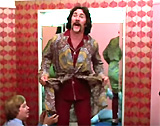  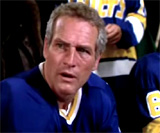 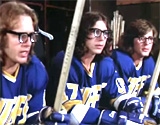 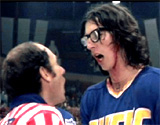 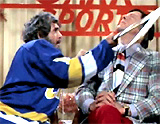 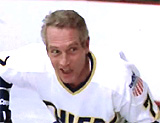 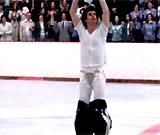
|
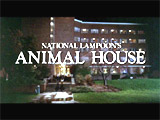
|
Animal House (1978) (aka National Lampoon's Animal House) Outrageousness prevailed in the Delta fraternity house (at Faber College) in director John Landis' classic frat-house, gross-out comedy starring Saturday Night Live TV comedian John Belushi in his film debut as animalistic "Bluto" Blutarsky. His character exhibited numerous belches and slobbish behavior (such as crushing beer cans on his head) - and he exhibited further grossness in his progress through the cafeteria lunch room counter, piling up food on his tray and sucking down a plate of Jell-O in one gulp - followed by his guess-what-I-am-impersonation of a zit when he punched his cheeks to send food in all directions ("I'm a zit. Geddit?") - and his instigation of a food fight. He was memorable for the comic, factually-inaccurate line: "Did you say over? Nothing is over until we decide it is. Was it over when the Germans bombed Pearl Harbor? Hell no!... It ain't over now. Cause when the goin' gets tough, the tough get goin'. Who's with me? Let's go. Come on!" He also enjoyed a voyeuristic Peeping Tom scene outside the window of self-pleasuring Mandy Pepperidge's (Mary Louise Weller) sorority house causing his ladder to fall backwards.
"I'm a zit! Geddit?"
The peeping-tom striptease scene. |
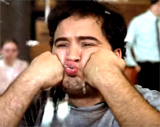 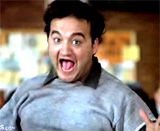 Cafeteria Chaos: "Food Fight!"  Bluto's Speech: "Did you say over? Nothing is over until we decide it is" 
"Peeping Tom" Scene |
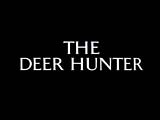
|
Storywriter/producer/director Michael Cimino's epic about war and friendship was a powerful, disturbing and compelling look at the Vietnam War through the lives of three blue-collar, Russian-American friends in a small steel-mill town before, during, and after their service in the war. The three close, hometown, "macho" working-class, male-bonded Russian-American buddies, who would test their masculinity in war in the airborne division, were leader and sportsman Michael Vronsky (Robert De Niro), gambler Nick (Christopher Walken), and soft-spoken and vulnerable Steven (John Savage). The film displayed the aftermath of the war and its physical and psychological effects upon the three male participants in the war and those left at home (wives, families, and friends). Only one of the three survived physically intact, but all of them emerged irrevocably changed.
"One shot, one shot." "You have to think about one shot. One shot is what it's all about. The deer has to be taken with one shot. I try to tell people that - they don't listen."
The contrived, theatrical, and fictional Russian Roulette torture scene, imposed on the American POW's during wartime and played as a game in a Vietnamese gambling den. |
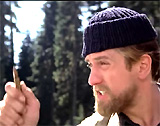 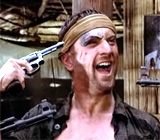 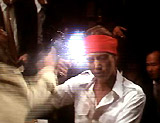 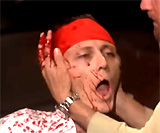
|
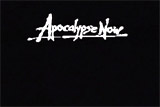
|
Producer/director Francis Ford Coppola's visually beautiful, ground-breaking masterpiece featured surrealistic and symbolic sequences detailing the confusion, violence, fear, and nightmarish madness of the Vietnam War. This war story's screenplay became a metaphorical backdrop for the corruptive, hallucinatory madness and folly of war itself for a generation of Americans. Although the film was flawed by its excesses, an ambiguous and incohesive script, and a baffling ending, it still remains a brilliant evocation of the madness and horrors of war. The film told about US Army assassin Willard's (Martin Sheen) mission, both a mental and physical journey, to 'terminate' dangerously-lawless warlord and former Colonel Kurtz (Marlon Brando) who had gone AWOL, become a self-appointed god, and ruled a band of native warriors in the jungle. The re-released version in 2001, titled Apocalypse Now Redux, added an expanded Playboy Playmates sequence (with nudity) in which protagonist Willard exchanged some of the boat's reserve fuel for several of his randy crew members to have sex with the female entertainers ("the Bunnies").
"You smell that? Do you smell that?...Napalm, son. Nothing else in the world smells like that. I love the smell of napalm in the morning. You know, one time we had a hill bombed, for twelve hours. When it was all over I walked up. We didn't find one of 'em, not one stinkin' dink body. The smell, you know, that gasoline smell, the whole hill. Smells (or smelled) like - victory. (A bomb exploded behind him.) Some day, this war's gonna end."
The early morning helicopter raid, with Wagner's "Ride of the Valkyries." |
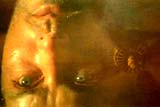  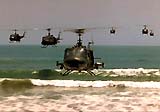 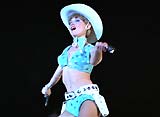
|
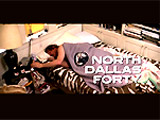
|
North Dallas Forty (1979) Ted Kotcheff's un-nominated, uncompromising, cynical and brutal expose of NFL pro-football (loosely based on the championship Dallas Cowboys team of the 70s) was one of the most realistic sports films ever made. The critically and commercially successful sports drama, an adaptation of Peter Gent's 1973 novel, showcased the dark side of professional football, involving drug use and alcohol (painkillers), racism, sexual perversity, and corporate labor abuses. Semi-autobiographical scripter and former Dallas Cowboys wide-receiver Peter Gent wrote the best-selling 1973 unflattering novel upon which the film was based. He had spent five seasons playing for the NFL. It starred Nick Nolte as jaded, rebellious North Dallas Bulls wide-receiver Phillip Elliott (based upon Gent), Mac Davis (in his film debut) as sex-obsessed quarterback Seth Maxwell (paralleling real-life Cowboys quarterback "Dandy" Don Meredith), and G.D. Spradlin as ruthless team coach B. A. Strothers (based upon coach Tom Landry). The gridiron film also starred real-life players, such as John Matuszak.
"I've never seen titties like yours, I swear to God, I never have. They're beautiful..." "I love your legs. They got your feet at one end and your p---y at the other, and I wanna f--k you." "Ladies, ever had a quarterback sandwich?" "Freud says that guns are an extension of your dick, Joe Bob."
The scene of two football players fist-fighting in the locker room to prepare for the game. |
  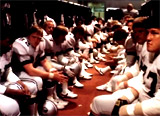 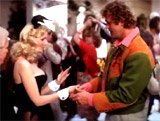 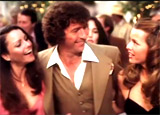 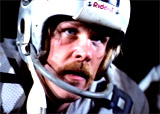
|